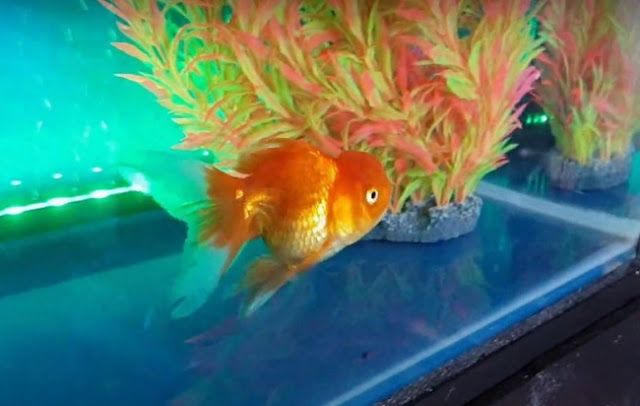Top 5 Freshwater Fish for Beginners:
Not every fish has the same level of tolerance. A beginner fish is the one which can sustain in harsh conditions. Such fish has more chances of enduring harsh conditions imposed due to wrong water parameters. They can tolerate what delicate fish can’t. Beginner fish can endure even if you make mistake while caring them such as there is fluctuation in water temperature, water hardness & pH does not meet the ideal pH needed by fish, & also there is unwanted algae & water is not clear such as there is higher levels of toxic components in water.
Betta Fish:
If you wish to care well for your betta, then find ways to keep them happy & healthy. Avoid activities that can put stress on your betta. Betta are genius & beautiful fish, & need quality environment so do not put them in bowl.
Betta Fish Aquarium Size:
Betta requires a tank which
contains 5 gallons of clean water, but minimum water required in tank is 2.5
gallons. Small tanks are worse because it is difficult to maintain them. Do not
keep Betta in bowls. Cover your tank because betta can jump out. Keep some free
space at water surface or do not fill it up to its maximum capacity. Keep
females in union of 5 or more in one tank. Use tank divider to make room for 2
bettas in a single tank. Betta needs natural or artificial light so they are
awake during day & when its night, they can rest. Decorations or live
plants can offer shade so that betta fish can avoid tank lighting.
Betta Water Temperature & Quality:
Ideal water temperature for betta
fish is between 76 to 81 Degrees Fahrenheit. Betta fish love to live in water
with pH ranging from 6.5 to 7.5. Use de-chlorinated water in fish tank. Monitor
water temperature via a thermometer. Use aquarium filter to control toxic
components level.
Betta Tank Mates:
Some types of betta are aggressive in nature & they don’t want to share same tank with mates, but other bettas can happily live with non-aggressive fish that do not exhibit bright colors or long fins.
You can keep other fish with betta in case you have a large tank with multiple hiding spots. Our advice is to keep betta in an aquarium that can hold 8 or more gallons of water to provide many hiding spots.
More space in large tanks will limit the territorial instincts of betta & may lower its aggression against certain types of fish.
Do not keep 2 male bettas
together because they will battle till death or unless one of them is extremely
stressed.
Betta Fish Diet:
Bettas are carnivores & they
like to eat protein rich food. Do not cover water surface because bettas like
to eat from water surface. They like to eat food of their choice & variety
of foods. Overfeeding betta causes health problems. Feed them only 2-4 pellets,
1-2 times daily.
White Cloud Minnows:
White Cloud Minnows is a little
colorful fish. This fish can live in harsh conditions & these are beginners’
fish as they can tolerate different temperature & water quality. They like
to live in cold water. They like to be in groups of at least 6 fish.
White Cloud Minnows Aquarium Size:
Minimum Aquarium Size for White
Cloud Minnows is 10 gallons. White Cloud Minnows needs easy care level. They
are peaceful in nature. Their life span is about 5 years. Their approximate
size is 1.5 inches.
White Cloud Minnows Water Temperature & Quality:
White Cloud Minnows needs pH
between 6 to 8. Water temperature required for this fish is 64 to 72 Degrees
Fahrenheit. Water hardness for this fish is between 5 to 20 dGH.
White Cloud Minnows Tank Mates:
White Cloud Minnows is a peaceful
fish & can be kept in community if other species are not likely to hurt or
eat them.
White Cloud Minnows Diet:
White Cloud Minnows can eat all
kinds of diet, such as live, frozen & flake diets.
Goldfish:
Goldfish are hardy fish & don’t
get ill easily. Good quality of water can save them. Feed your goldfish a
variety of diets. Make sure you check water regularly to avoid your fish from
getting sick.
Goldfish Aquarium Size:
Goldfish are hardy fish & they
are for beginners & experts. Ensure you are planning to setup a tank that
has enough water so choose a tank suitable for them even they grow in size. A 3
feet aquarium is the suggested size for your gold fish.
Goldfish Water Temperature & Quality:
Fancy goldfish are delicate &
need warmer water that does not change temperature quickly. But most of the
goldfish can do well even without using heater. pH is not important for
goldfish but ideally this fish love to live in water with pH between 7 to 8.4.
Goldfish Tank Mates:
Adding aggressive mates can hurt your goldfish. They are nonviolent & will not like the company of aggressive barbs, African cichlids & larger cichlids.
Do not add smaller fish because
goldfish like to swallow things in mouth & might swallow those little fish
too. Below you can find list of mates that can live happily with goldfish:
- Hillstream Loach
- Brochis multiradiatus
- Dojo Loach
- Bristlenose Pleco
- Rubbernose Pleco
- White Cloud Mountain Minnows
- Ricefish
- Hoplo Catfish
- Variatus Platy
- Longfin Rosy Barbs
Goldfish Diet:
Variety of diets will help your goldfish in growing well. Feed your goldfish fish flake & granules. Also offer them treats including live brine shrimp, frozen brine shrimp, daphnia & veggie mix.
Feed your fish 2 – 3 times every day.
Overfeeding goldfish can cause digestion problem & can poison water. Only
offer food to goldfish that they can eat in 2 minutes.
Platy:
Platies are hardy in nature, & do not require much care. Platies are active & they are available in a variety of colors. They are famous & many fish keepers love to keep them in tanks. They are small in size & their maximum size is only about 3 inches.
Platy Aquarium Size:
Due to small size, platies can
live in small to medium aquarium. Platies require at least 10 gallons of aquarium
size.
Platy Water Temperature & Quality:
They are from Mexico &
Central America, so they like warm temperatures between 21 to 27 Degrees
Celsius. Use a heater that can heat water. Ensure your aquarium is clean by
installing a filter. Your aquarium must have mechanical & biological
filtration for purifying water & wiping out toxic chemicals present in the
water that releases from waste. Adding live plants & decorations can offer
hiding spots to your fish & live plants can be used as a natural filter
& it also oxidizes water. Platies like to have weak currents with a pH of 6.8
to 8 & water hardness between 10 to 28 dGH.
Platy Tank Mates:
Platies are ideal aquarium mates due to their peaceful nature. They can be highly active. They like to swim in groups.
Platies like to have little
peaceful fish in their community, for example Mollies, Swordtails &
Guppies. All mentioned fish are loosely related to platies. However, platies
welcome other peaceful fish too.
Platy Diet:
Platies like to have enriched vegetable food. They like treats including little crustaceans, insects, worms & plants. They are omnivorous in nature but like to have herbivorous diet.
Platies will like to eat most
diets including live, commercially made & vegetable diet. Offer them a
quality flake diet. An enriched vitamin diet will make the top coloration. Offer
your platy small quantities of food multiple times a day.
Rasboras:
Rasboras are schooling fish
related to barbs, danios, koi & goldfish. Rasboras are non-aggressive,
offering beautiful colors, & most of the fish grow up to 4 inches, so they
are the best choice for medium size tanks.
Rasboras Aquarium Size:
Rasboras are active & hard
fish, & they are among the best beginner fish for tanks that contain 10
gallons of water or bigger tanks. You can buy them in groups of 7 or more fish.
Rasboras Water Temperature & Quality:
While some of the species of
Rasboras are taken from the wild where water is softer & slightly acidic.
Most of the people keep this fish in aquariums that have water with higher pH
& alkalinity than their normal environment. For Rasboras, ideal pH is
between 6.8 & 7.8, alkalinity is between 3 to 8 Degree dKH & required water
temperature is between 75 to 80 Degree Fahrenheit.
Rasboras Tank Mates:
Rasboras can live happily in a planted tank & they do best in groups of 7 or more species. They will not feel that much stress & exhibit their top colors in a beautiful tank with dark substrate.
Rasboras live happily in
community due to their peaceful nature & most of the fish live well with
similarly sized species.
Rasboras Diet:
Most of the Rasboras like to eat
small insects, worms, zooplankton & other little crustaceans. They like to
eat Tropical Flakes, Color Flakes, Shrimp Pellets & Tropical Granules.



Post a Comment